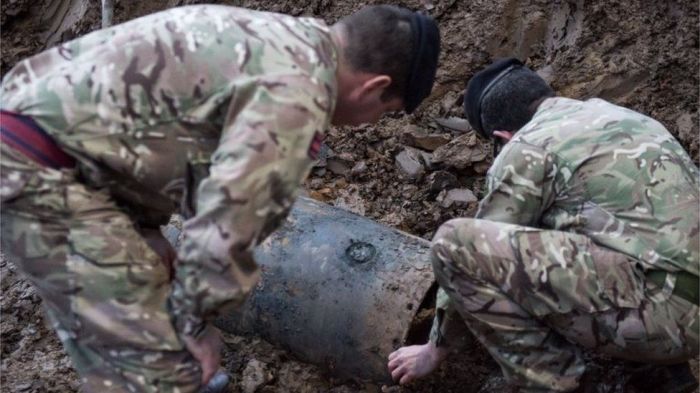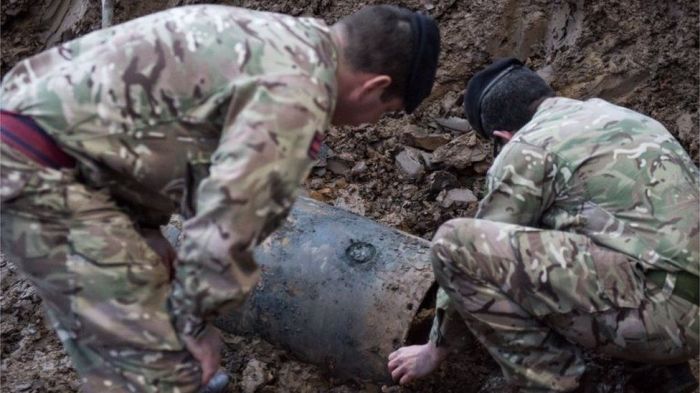
Bombing Will Not Make Us More Secure: A Critical Look at Security Strategies
Bombing will not make us more secure. This statement, though seemingly simple, challenges the deeply ingrained belief that military force is the primary, or even the only, path to security. We’ve been conditioned to equate bombs with strength, believing that a bigger bang equals a safer world.
But history is littered with examples of bombing campaigns that failed to achieve their stated objectives, often leaving behind a trail of devastation and instability.
This blog delves into the complex reality of security, examining why bombing is not only ineffective but also counterproductive. We’ll explore the unintended consequences of military intervention, the importance of addressing root causes of conflict, and the compelling case for alternative approaches to security that prioritize diplomacy, development, and social justice.
The Fallacy of Security Through Force: Bombing Will Not Make Us More Secure
The statement “bombing will not make us more secure” challenges the deeply ingrained belief that military might is the primary, or even the only, means of achieving security. This perspective, often referred to as “security through force,” has dominated global politics for centuries, but it is increasingly being questioned in the face of complex challenges like terrorism, climate change, and global pandemics.
Historical Examples of the Failure of Bombing Campaigns
The historical record is replete with examples where bombing campaigns have failed to achieve their stated security objectives. In many cases, they have actually exacerbated existing problems, leading to unintended consequences and further instability.
- The bombing of North Vietnam during the Vietnam War, intended to force the North Vietnamese government to negotiate, ultimately backfired, strengthening the resolve of the North Vietnamese and leading to a protracted and costly war. The bombing also had a devastating impact on the civilian population, contributing to the widespread suffering and displacement of Vietnamese people.
The idea that bombing will make us more secure is a dangerous fallacy. It ignores the complex realities of conflict and the unintended consequences of military action. In fact, the United States contributes directly to armed conflicts around the world, often exacerbating existing tensions and creating new ones.
This involvement only serves to perpetuate a cycle of violence and instability, ultimately making us all less safe. We need to find alternative solutions that address the root causes of conflict, rather than resorting to violence as a first resort.
- The 2003 invasion of Iraq, justified by the Bush administration as a means of preventing Saddam Hussein from developing weapons of mass destruction, ultimately failed to achieve its stated goals. The invasion led to the destabilization of Iraq, the rise of sectarian violence, and the emergence of ISIS.
It also had a profound negative impact on the Iraqi people, leading to a humanitarian crisis and widespread suffering.
Comparing Force with Alternative Approaches to Security
While the use of force can be a necessary tool in certain circumstances, it is not a comprehensive solution to security challenges. Other approaches, such as diplomacy, economic development, and social justice, are equally, if not more, important in creating a more secure world.
- Diplomacy involves engaging in dialogue and negotiation with other states or groups to resolve conflicts peacefully. It is a crucial tool for preventing conflict and promoting cooperation, which are essential for long-term security. The Iran nuclear deal, negotiated by the Obama administration, is a prime example of how diplomacy can be used to address a security threat without resorting to military force.
The idea that bombing will make us more secure is a dangerous illusion, often perpetuated by a media landscape heavily influenced by mainstream media and propaganda. These powerful forces often frame conflict in a way that simplifies complex issues, making it easier to justify violence as a solution.
However, history shows that bombing rarely achieves its intended goals, and often leads to more instability and suffering in the long run.
- Economic development is essential for promoting stability and reducing the root causes of conflict. Poverty, inequality, and lack of opportunity can create fertile ground for violence and instability. Investing in education, healthcare, and infrastructure can help to address these underlying problems and create a more secure environment.
The idea that bombing will make us more secure is a dangerous fallacy. It’s a simplistic solution to complex problems, and it often creates more chaos than it solves. The Pentagon, meanwhile, is busy rolling out its own brand of stealth PR, pentagon rolls out stealth pr , trying to convince us that their actions are necessary and effective.
But we need to be critical of these claims and demand real solutions that address the root causes of conflict, not just resort to violence.
The Millennium Development Goals, aimed at reducing poverty and improving living standards around the world, are a testament to the importance of economic development in promoting security.
- Social justice is a critical component of any sustainable security strategy. Injustice, discrimination, and exclusion can lead to resentment, anger, and violence. Promoting social justice through policies that address issues like racial inequality, gender discrimination, and economic disparities can help to create a more just and equitable society, which is essential for long-term security.
The civil rights movement in the United States, which fought for equal rights for all Americans, is a powerful example of how social justice can contribute to a more secure and stable society.
The Counterproductive Nature of Bombing

Bombing campaigns, despite their seemingly decisive nature, often have unintended consequences that undermine their intended goals. While they may achieve short-term tactical gains, they frequently sow the seeds of long-term instability and violence, jeopardizing the very security they aim to achieve.
The Human Cost of Bombing
Bombing campaigns often result in a significant number of civilian casualties. This is due to the indiscriminate nature of many weapons used in bombing, as well as the difficulty of targeting military objectives in densely populated areas. The loss of innocent lives is a tragic consequence of bombing, and it can fuel resentment and anger towards the perpetrators, further escalating conflict.
- A study by the Watson Institute for International and Public Affairs at Brown University found that between 2001 and 2021, US-led military operations in Afghanistan, Iraq, Pakistan, and Somalia resulted in an estimated 176,000 to 206,000 civilian deaths.
- The bombing of civilian infrastructure, such as hospitals, schools, and markets, can also have a devastating impact on the civilian population, disrupting essential services and exacerbating humanitarian crises.
The Creation of Refugees
Bombing can force people to flee their homes, creating a large refugee population. This displacement can have a significant impact on the social and economic fabric of the region, as well as strain the resources of neighboring countries.
- The Syrian Civil War, which began in 2011, has resulted in millions of refugees fleeing the country due to the widespread use of bombing by all sides of the conflict. The displacement of such a large population has put a significant strain on neighboring countries, such as Lebanon, Turkey, and Jordan, and has contributed to the instability in the region.
The Rise of Extremism
Bombing campaigns can create an environment that is conducive to the rise of extremism. When people feel that they are being targeted by foreign powers, they may be more likely to turn to extremist groups for protection or revenge.
- The US-led invasion of Iraq in 2003, which included extensive bombing campaigns, is widely seen as a major factor in the rise of the Islamic State of Iraq and Syria (ISIS). The invasion and subsequent occupation created a power vacuum that allowed ISIS to flourish, and the group’s ideology of resistance against foreign intervention resonated with many Iraqis.
The Long-Term Costs of Bombing
Bombing can have significant long-term social and economic costs. The destruction of infrastructure, such as roads, bridges, and power plants, can hamper economic development and create long-term challenges for rebuilding.
- The bombing of Iraq during the Gulf War in 1991 destroyed much of the country’s infrastructure, including its oil production facilities. This had a devastating impact on the Iraqi economy and contributed to the country’s instability in the years that followed.
The Cycle of Violence
Bombing can create a cycle of violence that is difficult to break. When a bombing campaign is launched, it often provokes retaliation from the targeted group, leading to further violence and escalation of the conflict.
- The bombing of Afghanistan by the US and its allies following the 9/11 attacks led to the Taliban regrouping and launching attacks against US forces. This cycle of violence has continued for decades, resulting in the deaths of thousands of civilians and soldiers.
The Importance of Addressing Root Causes

Bombing might seem like a quick fix to address insecurity, but it often creates more problems than it solves. To achieve lasting security, we need to delve deeper and understand the underlying factors that contribute to instability and conflict. These root causes are often complex and interconnected, but they are crucial to address for long-term solutions.
Understanding Root Causes
Addressing root causes is about tackling the fundamental issues that drive insecurity, such as poverty, inequality, and political instability. These factors create fertile ground for conflict and violence, making it more likely that people will resort to extreme measures.
Focusing solely on military solutions ignores these underlying issues, leading to a vicious cycle of violence and instability.
The Impact of Poverty and Inequality, Bombing will not make us more secure
Poverty and inequality are major contributors to insecurity. When basic needs are not met, people are more likely to turn to violence and crime. Furthermore, when resources are unevenly distributed, it can lead to resentment and conflict between groups.
Addressing these issues requires investing in economic development, promoting fair distribution of wealth, and providing opportunities for all.
The Role of Political Instability
Political instability, including corruption, weak governance, and lack of accountability, can also fuel insecurity. When governments are unable or unwilling to address the needs of their citizens, people may lose faith in the system and resort to violence. Promoting good governance, strengthening institutions, and ensuring transparency are essential for creating a stable and secure environment.
Examples of Successful Interventions
There are numerous examples of successful interventions that have focused on addressing root causes rather than resorting to force. For instance, in Colombia, the government has implemented a peace process that focuses on addressing the root causes of the conflict, including poverty, inequality, and lack of opportunity.
This approach has led to a significant reduction in violence and has helped to build a more stable and secure society.
“The best way to prevent violence is to address the root causes of conflict.”
Kofi Annan
Alternative Approaches to Security

The reliance on military force as the primary means of achieving security has proven to be ineffective and often counterproductive. Instead, we must explore a broader range of approaches that address the root causes of conflict and promote lasting peace.
Comparing Security Approaches
Different approaches to security have varying strengths and weaknesses, making it crucial to understand their nuances. The following table provides a comparison of four key approaches: military force, diplomacy, economic development, and social justice.
| Approach | Strengths | Weaknesses | Examples |
|---|---|---|---|
| Military Force | – Can deter aggression and protect national interests.
|
– Often escalates conflict.
|
– NATO’s intervention in Kosovo.
|
| Diplomacy | – Promotes dialogue and understanding.
|
– Can be slow and difficult.
|
– The Iran nuclear deal.
|
| Economic Development | – Can address poverty and inequality.
|
– Can be slow and difficult to implement.
|
– The Millennium Development Goals.
|
| Social Justice | – Addresses the root causes of conflict.
|
– Can be difficult to achieve in the short term.
|
– The fight against racial discrimination.
|
Actions to Promote Security Without Bombing
Governments and international organizations can take a number of concrete actions to promote security without resorting to bombing. These actions focus on addressing the underlying causes of conflict, building trust and cooperation, and promoting sustainable development.
Specific Actions
- Invest in diplomacy and conflict resolution:Increase funding for diplomatic missions, conflict mediation, and peacebuilding initiatives. This includes supporting organizations like the United Nations and regional peacekeepers.
- Promote economic development and poverty reduction:Invest in infrastructure, education, healthcare, and job creation in developing countries. This can help to address the root causes of conflict and create opportunities for economic growth.
- Address inequality and social injustice:Promote policies that address discrimination, poverty, and social exclusion. This includes ensuring equal access to education, healthcare, and economic opportunities for all.
- Strengthen international law and institutions:Support the development and enforcement of international law, including human rights law and the law of armed conflict. This can help to prevent conflict and ensure accountability for human rights violations.
- Promote cultural exchange and understanding:Support programs that foster dialogue and understanding between different cultures and societies. This can help to break down stereotypes and build bridges of trust.
- Invest in disarmament and arms control:Reduce the global stockpiles of weapons and promote arms control agreements. This can help to prevent the spread of weapons of mass destruction and reduce the risk of conflict.
Interconnectedness of Security Approaches
Different security approaches are not mutually exclusive but rather interconnected and complementary. The most effective strategies for achieving lasting peace involve a combination of approaches, working together to address the multifaceted nature of security threats.
“Security is not a product that can be bought or sold. It is a process that must be built through cooperation and collaboration.”






